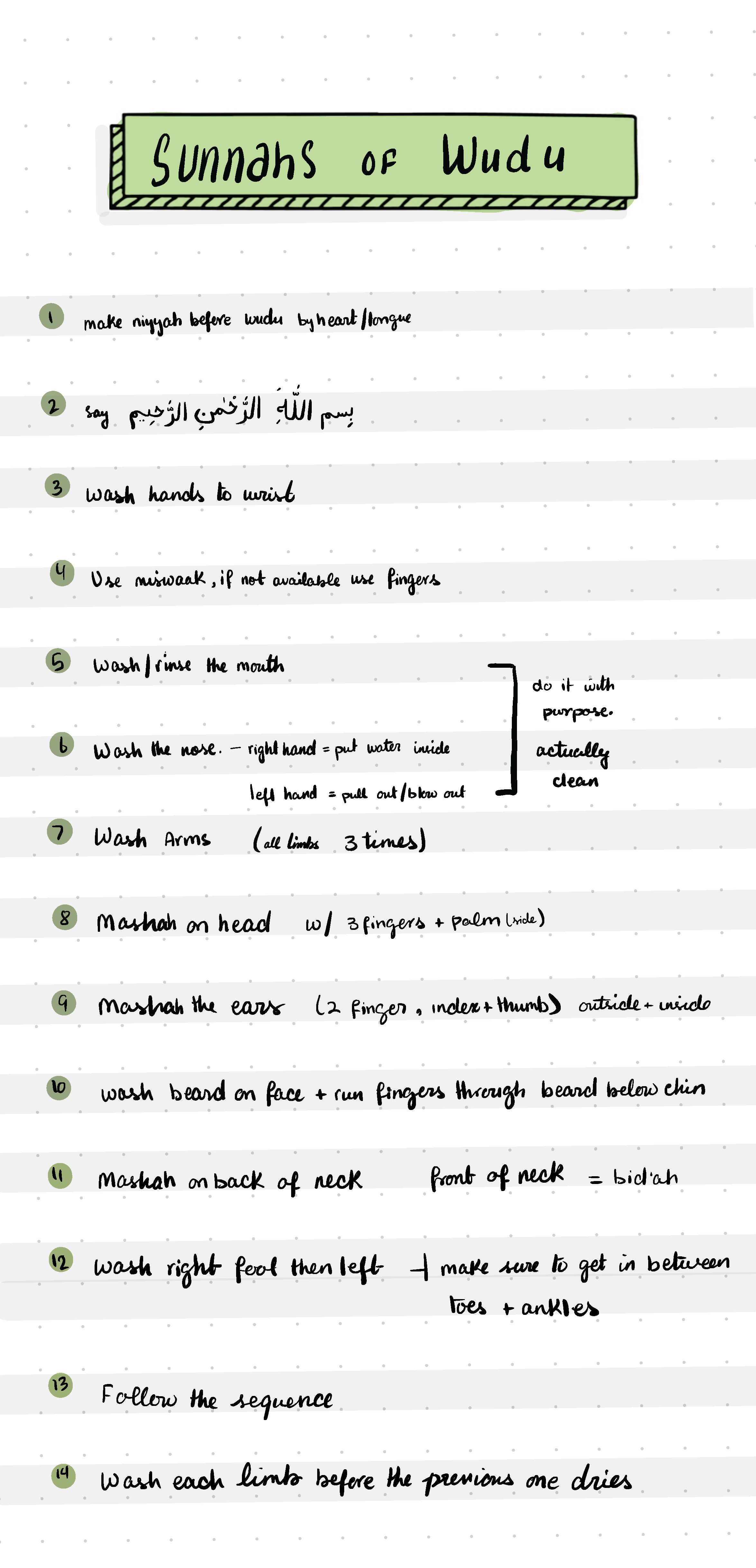Sunnahs of Making Wudu
The Sunnahs Of Wudu
20
SEPTEMBER, 2023

Sunnahs taken from “Fiqh al Mayasser” by Shafiq Ar-Rahman Al-Nadwi
The Sunnahs Of Wudu
20
SEPTEMBER, 2023

Sunnahs taken from “Fiqh al Mayasser” by Shafiq Ar-Rahman Al-Nadwi


Dua for Ease in all matters
22
November, 2022

Writer, Creator and Founder of JDD
Do you ever go through problems and tough situations and bear them thinking they’re just normal tests of this Dunya?
Being human I believe we do this out of habit. Sometimes, more than we’d like to admit, we just let situations overwhelm us or cause us stress because we think it’s normal or that it’s not such a big deal and we can get through it.
But why wait and get through it? Yes being patient is always recommended and preached in Islam but another thing that’s also recommended is precaution.
Precaution over cure. It’s better to try and prevent a stressful situation instead of letting it happen and then try to solve it. And Allah has made Islam so beautiful and complete that there is always a way out of a difficulty if we turn to Allah and ask for His Protection and Blessings. A powerful and simple dua that you can use daily before doing any act that you’d like ease in is
A short and simple dua that can be memorized easily.
Try and make it a habit of reciting this before doing anything to attain ease an Allah’s blessings in all your tasks.
Remember, the best way to make a dua is with sincere intentions and to have firm complete Faith in Allah and His Abilities.
Let me know, if this dua makes a difference in your life.

STORIES & EXPERIENCES
Mariam Ahmad, Writer of the Article,Creator and Founder of JDD
24th March, 2021
An art teacher said once: one day, I asked my little students in the primary class to draw the imagery of Spring (season)
All of them drew flowers, trees, rivers, birds, etc.…except one student who drew a Mushaf (Quran). I asked her why she drew a book of Qur’an. Her innocent answer brought tears to my eyes….
She said: “Qur’an is the Spring of my heart, that’s what mom taught me… Don’t we say in Dua’a :” I pray to Allah to make the Qur’an the spring of my heart, the light of my chest, the remover of my sadness, and the reliever of my distress?!”
MashaAllah! What a great and righteous mother is the one who raised this little girl!
Oh, Allah make the Qur’an the spring of my heart, the light of my chest, the remover of my sadness, and the reliever of my distress, Aameen.

MARIAM AHMAD
Author, Creator and Founder of JDD
Imam An-Nawawi or Abu Zakariya Mohiuddin Yahya ibn Sharaf Al-Nawawi was born in 631H (1233 C.E) at a place near Damascus, called Nawa. He was said to have had a great love for seeking knowledge, this love was to such an extent that although being very young (10 years) he avoided playing with the children and disliked any activity that distracted him from gaining knowledge and memorizing the Quran. As a result of which he became a Hafiz of the Quran at an early age.
His teachers and the Imams of his time recognized his abilities and counseled his father, who then took his son to Damascus in the year 649 A.H. for his formal education. He joined Madrasah Rawahiyah where he studied for two years and was guided by more than twenty celebrated scholars.
Sheikh Bakr Aboo Zayd, in his book “The Etiquette of Seeking Knowledge”, defines etiquettes and qualities that a true student of knowledge should possess. Imam An-Nawawi, being a true student of knowledge also possessed these characteristics. He devoted almost all of his time to seeking knowledge. It is said that he would not sleep until sleep overtook him, making him fall asleep sitting with his head resting on the books.
Al Qutb al-Yawnini said (Zarabozo):
“He would not waste any moment of the day or night but he would spend it busy with attaining knowledge. Even when he is walking in the streets he will be busy going over what he had remembered and reviewing his notes. He continued gaining knowledge in that way for a period of six years.”
His ability to study almost all day and night and perform acts of worship shows his pure intentions towards pleasing Allah (Subhanahu wata’Alaa) and gaining true knowledge.
Everyone including the elite of the society respected Imam An-Nawawi due to his piety, a great amount of knowledge, and exemplary character. He dressed simple and he ate simple. He lived a moderate life. He feared Allah and had high aims regarding the propagation of the faith.
He feared Allah and didn’t eat food whose source he didn’t know to be completely pure.
Chief Justice Sulayman az-Zara’i narrated that he visited An-Nawawi on the day of ‘Eid. An-Nawawi was eating some kind of broth with no meat. He asked Sulayman to eat with him and he said that is was not appealing to him. Sulayman’s brother went and bought some roasted meat and sweets. Sulayman told An-Nawawi to eat from it and he refused. Sulayman said to him, “O my brother, is this forbidden?” He said, “No, but it is the food of the tyrants [and extravagant]” (Zarabozo).
From this we can see him as an ascetic person. He had no longing to live a lavish life. Which is yet another characteristic listed by Sheikh Bakr Aboo Zayd. Imam An-Nawawi would fast continuously every day except Eid, he would only eat after the last prayer of the day and would only drink before dawn. The water he drank was cold so he would not become lazy. Al-Haddad says that An- Nawawi did this to stay away from the pleasures of this life and to be able to devote all his time to Allah and seeking knowledge for the sake of Allah.
Imam An-Nawawi’s modest nature is also well known. He would serve his students but would not take any services from them. He would not charge them for the knowledge he gave out. Except for the first couple of years. After that he never charged his students.
The celebrated Shaykh Mohiuddin expresses his impression about Imam an-Nawawi thus (A Short Biography of Imam an-Nawawi):
“Imam an-Nawawi had three distinctive commendable qualities in his person. If anybody has only one out of these three, people turn to him in abundance for guidance. First, having knowledge and its dissemination. Second, to evade completely from the worldly inclinations, and the third, inviting to all that is good (Islam) enjoining Al-Ma’ruf [i.e., Islamic Monotheism and all that Islam orders one to do] and forbidding Al-Munkar [polytheism and disbelief and all that Islam has forbidden]. Imam an-Nawawi had all three in him.”
Imam An-Nawawi did not live that long but he lived an excellent life, all for the pleasure of Allah and for spreading the Deen. At the age of 45, after returning to Nawa, he fell ill and died.
It is due to Imam An-Nawawi’s etiquettes, good manners, character, and pure intentions that he has become a highly known scholar throughout the Muslim World. A student of knowledge cannot achieve success in this world or the next but with pure intentions, love of Allah and His Messenger, and lack of arrogance and pride.